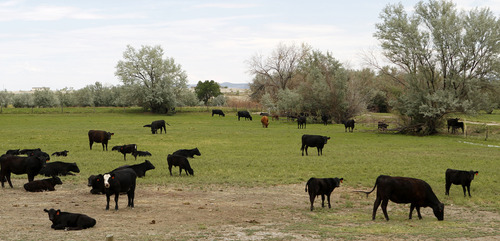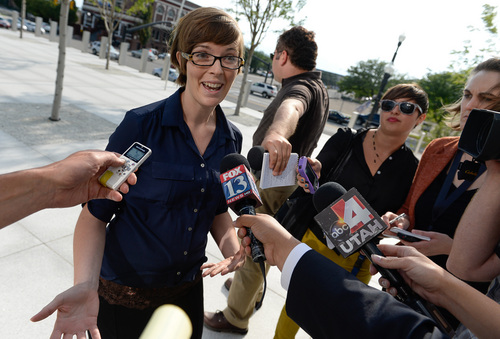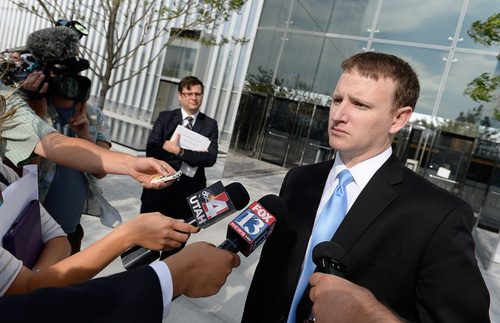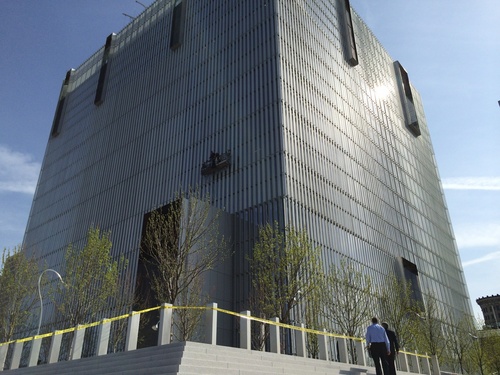This is an archived article that was published on sltrib.com in 2014, and information in the article may be outdated. It is provided only for personal research purposes and may not be reprinted.
A federal lawsuit challenging Utah's "ag gag" law, which activists say discriminates against free speech and discourages covert investigations into animal agricultural operations in the state, will proceed, a judge ruled Thursday.
U.S. District Judge Robert J. Shelby declined to toss the lawsuit despite a motion to dismiss from the state, who alleged the plaintiffs had not suffered any real harm as a result of the statute, which they said is narrowly tailored and lawful.
Utah's law makes undercover investigations and surreptitious recording of animal agricultural operations a class A misdemeanor crime, with a penalty of up to a year in jail.
Shelby, who said the case's main points will hinge on the law's supposed violation of the First Amendment, ruled that journalists and academics who had filed suit did not have proper standing to challenge the law — meaning they failed to show how they would or had suffered direct injury as a result of the statute.
But activists and investigators, including a local woman who was arrested and charged with agricultural interference, were cleared to proceed.
It was a win for the plaintiffs who allege the "agricultural operation interference" law adopted in 2012 by the Utah Legislature impairs public debate about animal welfare, food safety and labor issues on modern farms by criminalizing covert investigations and videography.
"I'm very excited," said Amy Meyer, an activist who was the first, and only, person to be arrested and charged under the law. "My case demonstrates that these 'ag gag' laws can be used to intimidate people out of their legal rights."
The lawsuit is the first of its kind in the nation to challenge the constitutionality of such laws, which the plaintiffs argue violates the First Amendment and Equal Protection Clause of the federal Constitution.
Attorneys for the state told the judge that the case should be thrown out because none of the plaintiffs face a threat of immediate prosecution, and the law is narrowly tailored enough such that it does not infringe on any legitimate investigations.
"The law was passed in response to a specific concern ... and so based on that we believe the law can withstand constitutional review," Assistant Attorney General Daniel Widdison said after the hearing. "We don't necessarily have to disavow targeting animal activists. That said, the law was designed not necessarily to target anyone but to protect this vital Utah industry."
In February 2013, Meyer was arrested as she stood on public property next to a slaughterhouse in Draper and recorded images with her cell phone, including one of workers pushing what appeared to be a sick or injured cow with a bulldozer.
The charge was later dismissed, but Meyer has alleged she was traumatized and fears future arrests because of the law, creating a "chilling effect" on her freedom of speech.
Other plaintiffs have said the law inhibits their ability to either investigate or report on investigations at animal agricultural operations.
Eight plaintiffs filed the lawsuit against Gov. Gary Herbert and the Utah attorney general's office: Meyer; the Animal Legal Defense Fund; People for the Ethical Treatment of Animals (PETA); news journal CounterPunch; author Will Potter; animal investigation consultant Daniel Hauff; animal agriculture scholar James McWilliams; and local blogger and activist Jesse Fruhwirth.
The lawsuit notes the history of journalistic exposés that triggered enforcement, reform and debate that began with Upton Sinclair's "The Jungle," which focused on unfair labor and animal cruelty in the meat-packing industry in the early 1900s. Sinclair's work contributed to enactment of the Federal Meat Inspection Act and the Pure Food and Drug Act.
After Thursday's hearing, CounterPunch, Will Potter, MCWilliams and Fruhwirth will no longer be parties in the suit.
But, lawyers said Thursday, because the other plaintiffs, and the case itself survived, the law will still be forced to withstand judicial scrutiny.
"There were legislators on the floor calling animal protection organizations 'terrorists' and 'jack wagons' and this was aimed to silence the speech of animal rights and animal protection organizations," said PETA's attorney Matt Strugar. "If this was a legitimate law, they wouldn't have passed it to protect a single industry and to single out one group critical of that industry. ... This is here to silence animal rights activists."
The state had not immediately decided Thursday whether it would appeal Shelby's ruling.
Several organizations have filed briefs in support of the plaintiffs including the Reporters Committee for Freedom of the Press and several national and local media organizations, including The Salt Lake Tribune.
Twitter: @Marissa_Jae











